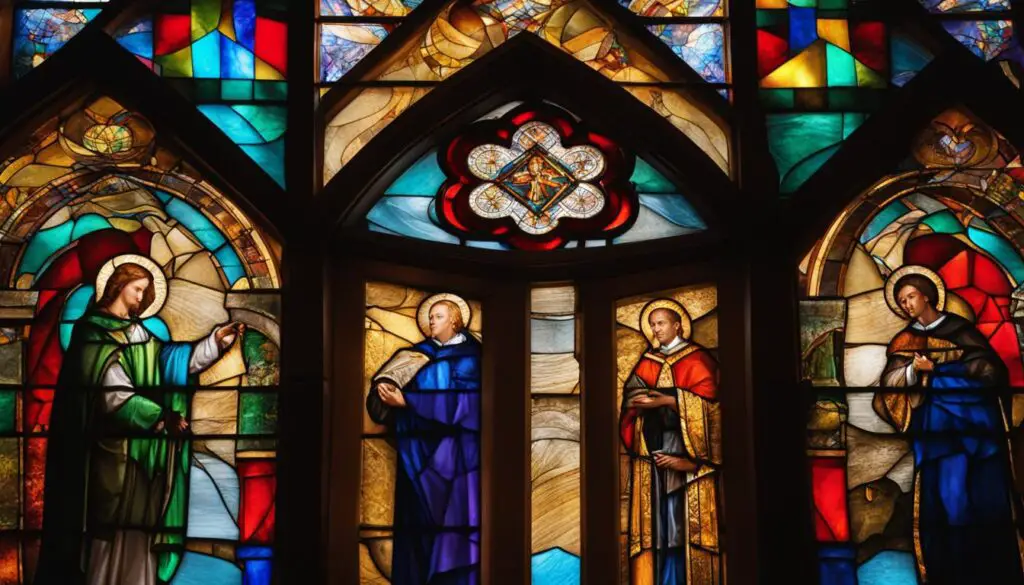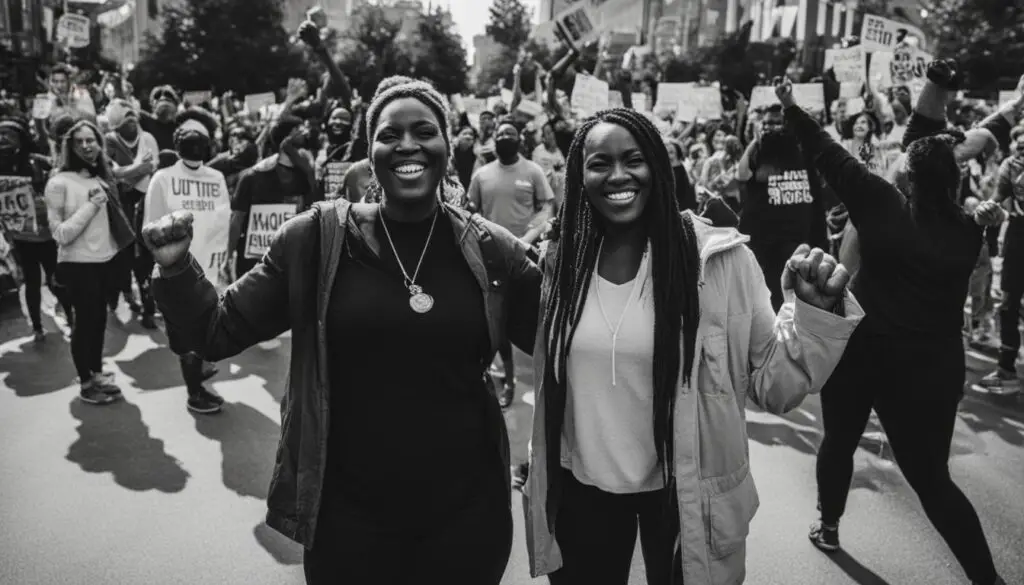Jonathan Daniels, a renowned civil rights activist, dedicated his life to the pursuit of equality and justice. Born in New Hampshire in 1939, Daniels’s unwavering commitment to his faith and principles guided his actions in the fight for civil rights. He played a pivotal role in the civil rights movement, leaving a lasting impact on American society.
What inspired Jonathan Daniels to dedicate his life to the cause of civil rights? Daniels’s unwavering faith and his deep belief in the inherent worth and dignity of every individual motivated him to take action. He saw the injustices faced by African Americans and was compelled to fight for their rights, joining marches, working towards voter registration, and advocating for racial equality.
Despite facing numerous challenges and encountering violence, Daniels persevered in his mission. He overcame fear and danger, standing alongside fellow activists in the face of adversity. His bravery and resilience served as an inspiration to others and helped raise awareness of the racial inequities that plagued the South during that time.
Jonathan Daniels’s impact on society cannot be overstated. His advocacy and sacrifice drew attention to the plight of African Americans in the struggle for civil rights. His tragic death highlighted the need for change and galvanized support within the Episcopal Church and the broader community. Daniels’s legacy is one of courage, compassion, and a deep commitment to justice.
Key Takeaways:
- Jonathan Daniels was a civil rights activist who fought for equality and justice.
- His faith and belief in the worth of every individual inspired his work.
- Daniels played a significant role in the civil rights movement, participating in marches and advocating for voter registration.
- He overcame challenges and faced violence, demonstrating incredible bravery and resilience.
- Jonathan Daniels’s impact on society was profound, bringing attention to the racial inequities of his time and inspiring greater support for civil rights.
Early Life and Calling to Service
Jonathan Daniels, born on March 20, 1939, in Keene, New Hampshire, discovered his calling to service through the Episcopal Church. Raised in a Congregationalist household, Daniels joined the St. James Episcopal Church during his senior year of high school, where he found solace and inspiration in his faith. Driven by a deep sense of purpose, he embarked on a journey that would lead him to become an influential figure in the civil rights movement.
After excelling academically, graduating first in his class from the Virginia Military Institute, Daniels briefly pursued studies at Harvard University. However, it was his encounter with the Episcopal Church that ultimately redirected his path. Feeling a strong calling to devote his life to service and justice, Daniels enrolled at the Episcopal Theological School in Cambridge, Massachusetts.

“I had come to evening Eucharist with the seminary community. It was not new for me… I knelt at the rail. I received the Body of Christ in bread. It was only a small piece of bread, but it contained all that I had ever wanted or needed.”
| Key Achievements | Impact on Society |
|---|---|
| Enrolled at the Episcopal Theological School, pursuing the path of service and justice. | Inspired others to follow their calling and dedicate their lives to the church and social justice causes. |
| Participated in marches, worked to integrate a church, and helped register African American voters. | Brought national attention to racial inequalities and contributed to the momentum of the civil rights movement. |
Jonathan Daniels’ early life and calling to service set the foundation for his future endeavors. His unwavering commitment to faith, justice, and equality fueled his passion for social change. Through his actions and achievements, Daniels inspired individuals to confront systemic injustices and work towards a more inclusive society.
Involvement in the Civil Rights Movement
Jonathan Daniels’s unwavering commitment to civil rights led him to actively participate in the historic march from Selma to Montgomery, Alabama, in March 1965. The events of “Bloody Sunday” deeply affected Daniels, fueling his determination to continue fighting for justice and equality.
“We shall not be moved,” Daniels proclaimed, his voice filled with conviction and hope. “The time for racial equality is now, and we must stand up against the injustice that plagues our society.”
Alongside fellow seminarians, Daniels worked tirelessly to integrate St. Paul’s Episcopal Church in Selma, breaking down barriers of segregation within religious institutions. Recognizing the importance of political empowerment, he also dedicated himself to helping African American citizens register to vote, battling the systemic oppression that denied them this fundamental right.
Daniels’s steadfast dedication to the cause drew significant attention to the racial inequities prevalent in the United States. His actions inspired countless others to join the civil rights movement, igniting a powerful force of change that would transform society.

In the face of adversity and opposition, Jonathan Daniels remained resolute, driven by his unyielding belief in the inherent worth and dignity of every individual. His unwavering pursuit of racial equality embodies the principles and values that lie at the heart of the civil rights movement.
Tragic Death and National Impact
On August 20, 1965, Jonathan Daniels and a group of protestors were arrested during a picket in Fort Deposit, Alabama. After their release, they were stranded without transportation back to Selma and sought refuge in a nearby store. There, they encountered Tom Coleman, who confronted them with a shotgun. Daniels heroically pushed Ruby Sales, a young African American woman, to the ground and took the full impact of the shotgun blast, sacrificing his life to save hers. Daniels’s murder, along with others during the civil rights era, drew national attention to the violence and discrimination African Americans faced in their pursuit of equality.

| Event | Impact |
|---|---|
| Murder of Jonathan Daniels | Drew national attention to racial violence during the civil rights era |
| Sacrifice to save Ruby Sales | Exemplified the bravery and selflessness in the fight for justice |
| Highlighted the ongoing struggles for equality | Inspired further activism and support for the civil rights movement |
Recognition and Legacy
In recognition of his sacrifice, Jonathan Daniels was added to the Episcopal Church’s Calendar of Lesser Feasts and Fasts as a martyr. The church honors him on August 14, the day of his arrest. He is also remembered as a martyr at Canterbury Cathedral in the United Kingdom. Daniels’s legacy extends beyond his own personal sacrifice. His death helped awaken the country to the ongoing violence and discrimination faced by those fighting for civil rights and stirred greater support within the Episcopal Church for the cause of racial equality.

Lessons from Jonathan Daniels
Jonathan Daniels’s life and death offer valuable lessons for today’s society. He exemplified the power of faith in the face of injustice, showing unwavering commitment to social justice and racial equality. Daniels’s courage and selflessness in protecting Ruby Sales demonstrate the importance of standing up for others and the willingness to sacrifice for the greater good.
His story reminds us of the ongoing struggles for civil rights and the need for individuals to actively work towards equality and justice.

Table: Lessons from Jonathan Daniels
| Lessons | Description |
|---|---|
| Power of faith | Jonathan Daniels’s unwavering commitment to social justice and racial equality, guided by his faith. |
| Courage and selflessness | His willingness to protect others and sacrifice his own life for the greater good. |
| Struggles for civil rights | The ongoing challenges faced in the pursuit of equality and justice. |
Jonathan Daniels’ Achievements and Impact
Jonathan Daniels played a pivotal role in the civil rights movement, leaving an enduring impact on American society. His unwavering dedication and courageous actions in the face of injustice inspired countless individuals to fight for racial equality and justice.
One of Daniels’ key achievements was his active participation in marches and protests during the civil rights movement. He fearlessly stood on the front lines, advocating for the rights of African Americans and demanding an end to racial discrimination.
In addition to his involvement in demonstrations, Daniels worked diligently to integrate St. Paul’s Episcopal Church in Selma, Alabama. By challenging the segregationist norms prevalent at the time, he made significant progress in breaking down barriers and fostering inclusivity within religious institutions.
Daniels also played a crucial role in helping African Americans exercise their right to vote. He worked tirelessly to register individuals who had long been denied this fundamental aspect of democratic participation. Through his efforts, Daniels empowered marginalized communities and helped pave the way for increased political representation.
Tragically, Daniels’ life was cut short when he was murdered while protecting Ruby Sales, a young African American woman, from a shotgun blast. This heinous act brought national attention to the violence and discrimination faced by African Americans during the civil rights era.
In the wake of Daniels’ death, his impact reverberated throughout the Episcopal Church and society at large. His sacrifice galvanized support for civil rights within the church, prompting a renewed commitment to equality and justice.
Today, Jonathan Daniels’ legacy lives on, inspiring individuals to confront systemic racism and work towards a more equitable future. His example teaches us the importance of taking a stand against injustice, even in the face of extreme adversity. Daniels’ unwavering dedication to the principles of equality and justice serves as a powerful reminder that one person’s actions can make a profound difference in the world.
Key Principles and Values of Jonathan Daniels
Jonathan Daniels was a remarkable individual driven by a powerful belief in equality and justice. His unwavering commitment to civil rights and social justice was deeply rooted in his Christian faith. Daniels firmly believed in the inherent worth and dignity of every individual, and he dedicated his life to dismantling systems of oppression that stood in the way of equality and justice for all.
One of the core principles that guided Jonathan Daniels was love. He understood that love is not a passive emotion but an active force for change. In the face of injustice, he demonstrated immense compassion and empathy, willing to put himself at risk to protect others during the civil rights movement. Daniels’s love for his fellow human beings inspired and empowered him to challenge the status quo and fight for a more just society.
Compassion was another fundamental value that defined Daniels’s actions. He recognized the suffering and systemic injustices experienced by marginalized communities, particularly African Americans in the South, and he dedicated himself to alleviating their pain. With a compassionate heart, Daniels actively sought to understand the struggles faced by others and amplify their voices, so that their stories could be heard and their rights upheld.
“True compassion is more than flinging a coin to a beggar; it comes to see that an edifice, which produces beggars, needs restructuring.” – Jonathan Daniels
Equally important to Daniels was the pursuit of a more just society. He believed that justice should be the bedrock of any civilization, and he tirelessly worked to challenge and dismantle the structures that perpetuated inequality and systemic discrimination. Daniels understood that achieving justice required not only legal reforms but also a transformative shift in societal attitudes and values.
Through his unwavering commitment to principles such as love, compassion, and justice, Jonathan Daniels became an embodiment of the profound impact that an individual driven by strong values and principles can have on society. His actions and sacrifices during the civil rights movement played a significant role in raising awareness of racial injustices and inspiring others to join the fight for equality.
Jonathan Daniels’s enduring legacy serves as a reminder of the importance of upholding these key principles and values in our own lives. His life and work teach us that genuine change begins with the unwavering commitment to equality and justice, guided by love and compassion. Daniels’s example continues to inspire generations to stand up against injustice and work towards a more equitable and just world.
Remembering Jonathan Daniels
Each year, individuals gather in Hayneville, Alabama, for a pilgrimage to remember Jonathan Daniels and the other martyrs of Alabama. The pilgrimage is a sacred and moving event, honoring those who lost their lives in the long struggle for equality and justice. It serves as a reminder of the sacrifices made by individuals like Daniels, who fought tirelessly for a more equitable and inclusive society.
The commemoration provides an opportunity for people from different backgrounds to come together and reflect on Daniels’s sacrifice. It is a time to honor his unwavering commitment to social justice and racial equality. Through this pilgrimage, participants pay homage to Daniels’s legacy and renew their dedication to advancing the cause of justice.
The pilgrimage is a powerful reminder that the fight for equality and justice is ongoing. It is a call to action for individuals to continue the work that Daniels started, inspiring others to stand up against injustice and discrimination. Participants leave the pilgrimage with a renewed sense of purpose and a deeper understanding of the importance of honoring the sacrifice made by those who fought for a more just society.
The pilgrimage to remember Jonathan Daniels is more than just a commemoration; it is a catalyst for change. It serves as a reminder that the work is not yet finished and that each individual has a role to play in creating a more equitable and just world. Through reflection, education, and action, participants take part in the ongoing struggle for social change and carry on Daniels’s legacy of courage and sacrifice.
Conclusion
Jonathan Daniels, a true champion of civil rights and racial equality, has left an enduring legacy that continues to inspire and drive positive change. His unwavering commitment to justice, driven by his faith, serves as a powerful reminder of the impact one individual can have on society. Daniels’s selfless sacrifice and tireless efforts to combat racial discrimination have shown us the strength of character and resilience needed to overcome challenges and fight for a more inclusive and just world.
His key achievements, including participation in marches, facilitating voter registration, and working to integrate churches, have left an indelible mark on the civil rights movement. Daniels’s dedication and determination, in the face of adversity, sent a powerful message that equality and justice are worth fighting for.
At the core of Daniels’s principles were love, compassion, and the belief in the inherent worth and dignity of every individual. His actions embodied the values of equality and justice, highlighting the importance of dismantling oppressive systems and creating a society that embraces diversity and inclusion.
As we reflect on Jonathan Daniels’s life and work, we are compelled to examine our own values and principles. His legacy serves as a call to action for each of us to confront inequality and to actively work towards a more equitable future. By following in his footsteps, we can honor his memory and contribute to the ongoing pursuit of racial equality and social justice.
FAQ
Who was Jonathan Daniels?
Jonathan Daniels was a civil rights activist known for his dedication to equality and justice.
What were Jonathan Daniels’ achievements?
Jonathan Daniels participated in marches, worked to integrate a church, and helped register African American voters.
What impact did Jonathan Daniels have?
Jonathan Daniels’ death drew attention to racial inequities in the South and inspired greater support for civil rights within the Episcopal Church.
What is Jonathan Daniels’ legacy?
Jonathan Daniels is remembered as a martyr in the Episcopal Church and his sacrifice continues to inspire individuals to fight for racial equality and justice.
What were Jonathan Daniels’ key values?
Jonathan Daniels’ actions were guided by principles of love, compassion, and the pursuit of a more just society.

